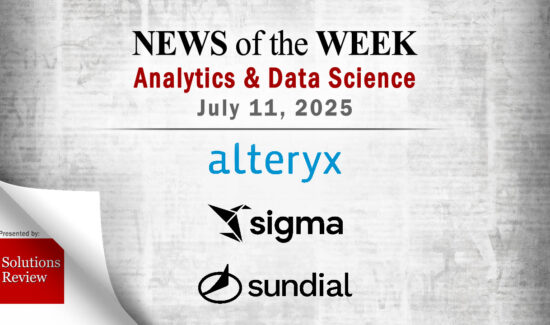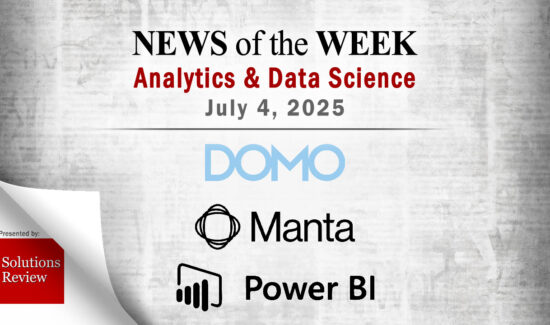What’s Changed: 2022 Gartner Magic Quadrant for Analytics and Business Intelligence Platforms


The editors at Solutions Review highlight what’s changed since the last iteration of Gartner’s Magic Quadrant for Analytics and Business Intelligence Platforms and provide an analysis of the new report.
Analyst house Gartner, Inc. has released its 2022 Magic Quadrant for Analytics and Business Intelligence Platforms. Gartner defines the marketplace as enabling less technical users, including businesspeople to “model, analyze, explore, share and manage data, and collaborate and share findings, enabled by IT and augmented by artificial intelligence (AI). ABI platforms may optionally include the ability to create, modify or enrich a semantic model including business rules.”
Gartner notes that the market is represented by an emphasis on visual self-service for end-users, as well as augmented AI to deliver automated insights. However, that augmentation is largely shifting from the analyst to consumers and decision makers. These platforms are also beginning to capture more information about user behavior and interests in order to deliver the most impactful experience possible. The researcher expects this will be a trend that continues as analytics and business intelligence tools get integrated into personal productivity tools.
Many of the best business intelligence solutions are adding capabilities for users to create no-code automation workflows and applications. As a result, the markets for data science and machine learning software and cloud data analytics tools are diverging from that of traditional BI platforms. This is good for the consumer, as it pushes many of the providers to improve their analytics features while helping organizations maintain a balance between control and agility while scaling multipersona, advanced analytics tools, and new and emerging use cases.
Gartner highlights the following providers in the analytics query accelerators market: Microsoft (Power BI), Salesforce (Tableau Software), Qlk, Google (Looker), Domo, ThoughtSpot, Sisense, Oracle, TIBCO Software, SAP, IBM, SAS, Yellowfin, Tellius, Amazon Web Services (AWS), MicroStrategy, Alibaba Cloud, Pyramid Analytics, Zoho, and Incorta.
Gartner adjusts its evaluation and inclusion criteria for Magic Quadrants as software markets evolve. As a result, Incorta, Tellius, and Zoho were added to the report. BOARD International, Infor (Birst), and Information Builders were removed for no longer meeting the inclusion criteria.
In this Magic Quadrant, Gartner evaluates the strengths and weaknesses of 20 providers that it considers most significant in the marketplace and provides readers with a graph (the Magic Quadrant) plotting the vendors based on their ability to execute and completeness of vision. The graph is divided into four quadrants: niche players, challengers, visionaries, and leaders. At Solutions Review, we read the report, available here, and pulled out the key takeaways.
For the second-straight year, Microsoft (Power BI), Tableau (now a part of Salesforce), and Qlik dominate the market. While Microsoft touts massive market reach and a comprehensive product roadmap, its new “goals” capability, an alignment with other productivity tools, and good price-to-value ratio keep it atop the list. Salesforce (Tableau) recently dropped new Slack integrations and an improved NLQ experience. That combined with a business user-centric approach and an “in” to the Salesforce ecosystem has its arrow pointing straight up. Qlik added a slew of new capabilities in 2021 (including technology buys) and has plans to go public soon.
Google (Looker) and Domo are the lone market Challengers for 2022. Google continues to integrate Looker with its other products (namely Google Data Studio) in the near term, and new extension frameworks are a fully hosted development surface that enables developers to build data-powered apps. Domo mostly sells directly to lines of business due to its ease of use. The company is also popular in multi-cloud scenarios where an organization chooses non-Microsoft clouds. Domo has lots of momentum in the space, according to Gartner.
ThoughtSpot remains a stone’s throw away from attaining Leaders status but introduced several key feature updates (Everywhere, developer playground, custom action, pre-builds for KPIs). The company has additional plans for a notebook-style SQL workspace and digital workplace tools integration. ThoughtSpot is a major player in the augmented analytics market. Beyond ThoughtSpot, several “mega-vendors” are also Visionaries again for 2022: Oracle, SAP, SAS, and IBM.
Three established and top-rated vendors Sisense, TIBCO, and Yellowfin are Visionaries this year. Sisense is unique due to its developer framework, multipersona tools, and composable vision. Sisense is also excellent for embedded BI. TIBCO offers tools for data science, visual data discovery, and streaming analytics. Its advanced data preparation is a differentiator as well. Yelllowfin is making strategic investments in augmentation tools like guided NLQ. The firm also enhanced its application development experience in a recent refresh.
New entrant Tellius rounds out the Visionaries class, offering a strong supper for multiple personas, augmented analytics, and scalability that make it an interesting choice. The Tellius Platform combines AI and machine learning with a search interface for ad hoc exploration so users can ask questions about their business data, analyze billions of records, and gain automated insights. The company recently launched Live Insights, which offers AI-guided insights from cloud data warehouses without moving data.
Along established brands in the global enterprise cloud market like AWS and Alibaba Cloud, MicroStrategy and Pyramid Analytics headline notable names among Niche Players. MicroStrategy “excels at scalability, manageability and security desired by IT” and offers “rich BI and reporting functionality” according to Gartner. The firm also launched a new containerized, microservices-driven platform architecture and continued its accumulation of popular cryptocurrency Bitcoin in 2021. Pyramid Analytics is a top choice in financial services, insurance, retail, and manufacturing, solving for a breadth of use cases and offering direct query and full-featured deployment options.
Incorta and Zoho debut as Niche Players and round out the representative vendors included in Gartner’s Magic Quadrant. Incorta features a Direct Data Mapping engine which provides real-time aggregation of complex business data without needing a data warehouse. Users can drill from top line, aggregated KPIs to supporting transaction records with one click. Zoho features a drag-and-drop designer, as well as different visualization tools to drill down to specifics. A “smart” assistant called Zia can answer questions in the form of reports and KPI widgets via AI, machine learning, and natural language processing.
































